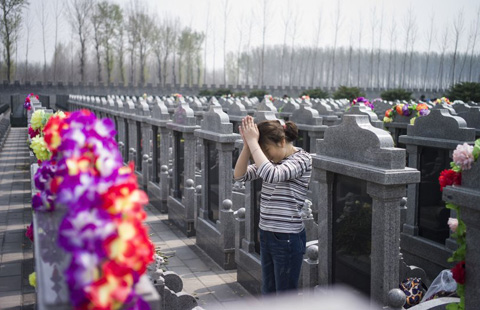China's "long, steep road" to safer food
Updated: 2015-04-07 13:47
(Chinadaily.com.cn)
|
||||||||
Having safe, nutritious food on every plate in China is a momentous task and one that China’s government has made great strides in achieving. Yet for every gain there are setbacks, from unsafe use of pesticides to insufficient inspectors in food production facilities. The high profile food crises in the past years have gained headlines in China and around the world. When will the people of China be able to fully trust the food they eat?To ensure food safety for every citizen, China has a long, steep road ahead.
The enormous scale of the food safety industry – like the country it works to feed – shows there are no quick fixes or easy answers. China feeds around 20% of the world’s population with 9% of the world’s land, and 6% of its water.The food industry is made up of millions of businesses – and valued at approximately 12 trillion RMB ($1.93 trillionUSD) in 2014, it is an important sector in China’s powerhouse economy. Ensuring the safety of all food grown, produced and consumed in China is no small task.
Unsafe food poses major health threats, as it contains harmful bacteria, viruses, parasites or chemical substances. These cause more than 200 diseases ranging from diarrhea to cancer. Most of these health threats are preventable.
Aside from food hygiene (which can cause foodborne disease from bacteria and other infectious agents), some of the causes of unsafe food in China include chemical contamination by pollutants,and veterinary drug residue, such as from misuse and overuse of antibiotics in farming. The Government of China is taking steps to address these problems. But they cannot be solved overnight: addressing many of these issues will require fundamental changes all the way along the food chain.
Premier Li Keqiang told the State Council last year that food was essential, and safety should be a top priority. This was recognition that China needs to focus on the problems posed by unsafe food.The Government included food safety in the12th Five-Year Plan for Social and Economic Development, and it will likely continue to be a priority in the 13th Five-Year Plan.
Since 2001, a series of reforms have been conducted to strengthen food safety management in China. This work culminated with the adoption of a modern and comprehensive national Food Safety Law in 2009,and the establishment of the State Council Food Safety Commission in 2010.
Another crucial step was taken in March 2013 when the China Food and Drug Administration (CFDA)was created. This modern-era regulator is the central body responsible for the safety of the nation’s food and drug supply. Its responsibilities include the supervision and administration on the safety of production, circulation and consumption processes of food and drugs as well as inspection and testing. Before the creation of the CFDA, responsibilities for food safety within the national government were scatteredamong a number of different government departments – often with gaps and overlaps.
- Vietnam, Russia agree to deepen energy cooperation
- Museum reveals evidence of alleged Japanese wartime 'medical experiments'
- Brazilian student masters Chinese
- France bans super-skinny models in anorexia clampdown
- Russian planes evacuate over 300 people from Yemen
- Survivors from Kenyan university attack sent back home

 Steeping the leaves
Steeping the leaves
 2015 Miss Kyrgyz beauty pageant concluded
2015 Miss Kyrgyz beauty pageant concluded
 Intl Pillow Fight Day celebrated around world
Intl Pillow Fight Day celebrated around world
 The journey through blossoms
The journey through blossoms
 Former president Fidel Castro appears in public in Cuba
Former president Fidel Castro appears in public in Cuba
 Now and then: Changing funeral trends
Now and then: Changing funeral trends
 Chinese honor war heroes on Tomb Sweeping Day
Chinese honor war heroes on Tomb Sweeping Day
 Lunar eclipse turns the moon 'blood red'
Lunar eclipse turns the moon 'blood red'
Most Viewed
Editor's Picks

|

|

|

|

|

|
Today's Top News
US to help China fight tough TB strain
Book promotes soft power
Sex education in China evolving
Number of super wealthy soars
US benefits from high-level engagements with China: Lew
China promotes eco-friendly burials
China to develop city clusters along middle reaches of Yangtze
HK commemorates 25th anniversary of Basic Law
US Weekly

|

|






